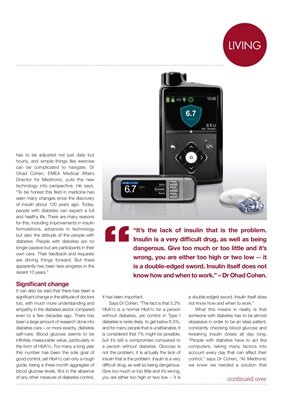
KITLIVING
continued over
""It's the lack of insulin that is the problem.
Insulin is a very difficult drug, as well as being
dangerous. Give too much or too little and it's
wrong, you are either too high or two low -- it
is a double-edged sword. Insulin itself does not
know how and when to work." - Dr Ohad Cohen.
diabetes no two days are alike, treatment
has to be adjusted not just daily but
hourly, and simple things like exercise
can be complicated to navigate. Dr
Ohad Cohen, EMEA Medical Affairs
Director for Medtronic, puts the new
technology into perspective. He says,
"To be honest this field in medicine has
seen many changes since the discovery
of insulin about 100 years ago. Today,
people with diabetes can expect a full
and healthy life. There are many reasons
for this, including improvements in insulin
formulations, advances in technology
but also the attitude of the people with
diabetes. People with diabetes are no
longer passive but are participants in their
own care. Their feedback and requests
are driving things forward. But there
apparently has been less progress in the
recent 10 years."
Significant change
It can also be said that there has been a
significant change in the attitude of doctors
too, with much more understanding and
empathy in the diabetes sector compared
even to a few decades ago. There has
been a large amount of research done into
diabetes care - or more exactly, diabetes
self-care. Blood glucose seems to be
infinitely measurable value, particularly in
the form of HbA1c. For many a long year
this number has been the sole goal of
good control, yet HbA1c can only a rough
guide, being a three-month aggregate of
blood glucose levels. But in the absence
of any other measure of diabetes control,
it has been important.
Says Dr Cohen, "The fact is that 5.2%
HbA1c is a normal HbA1c for a person
without diabetes, yet control in Type I
diabetes is rarely likely to get below 6.5%,
and for many people that is unattainable. It
is considered that 7% might be possible,
but it's still a compromise compared to
a person without diabetes. Glucose is
not the problem, it is actually the lack of
insulin that is the problem. Insulin is a very
difficult drug, as well as being dangerous.
Give too much or too little and it's wrong,
you are either too high or two low -- it is
a double-edged sword. Insulin itself does
not know how and when to work."
What this means in reality is that
someone with diabetes has to be almost
obsessive in order to be an ideal patient,
constantly checking blood glucose and
tweaking insulin doses all day long.
"People with diabetes have to act like
computers, taking many factors into
account every day that can affect their
control," says Dr Cohen, "At Medtronic